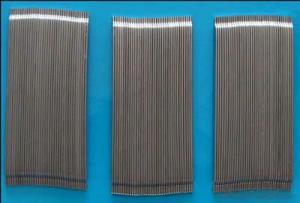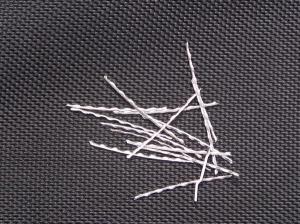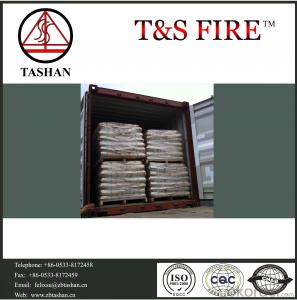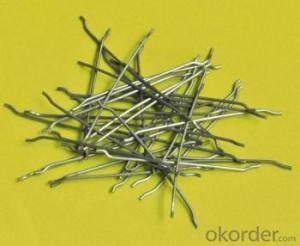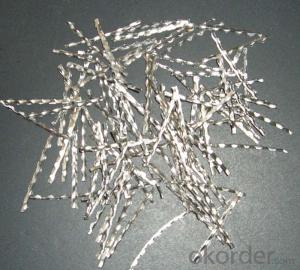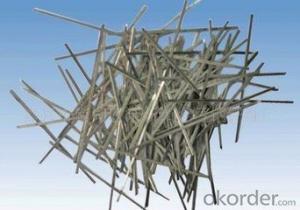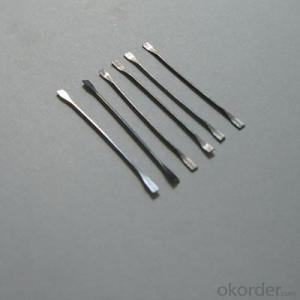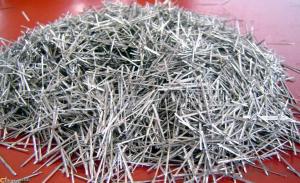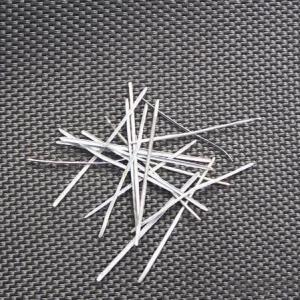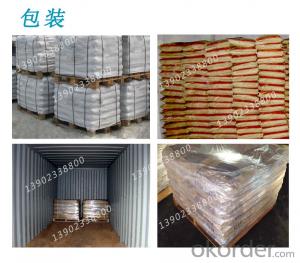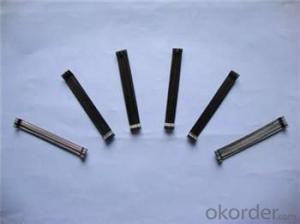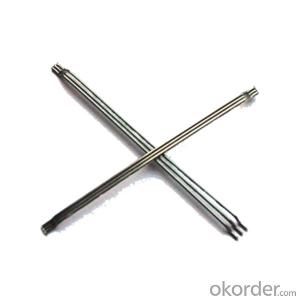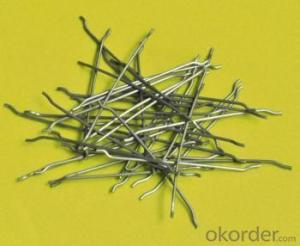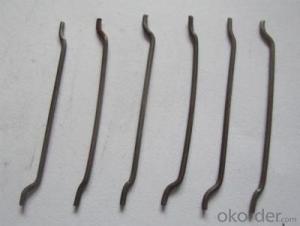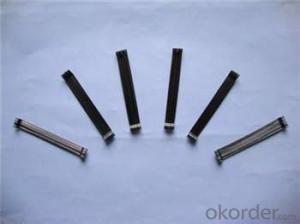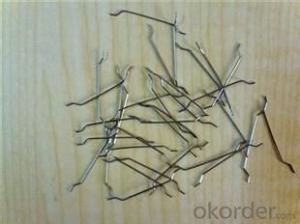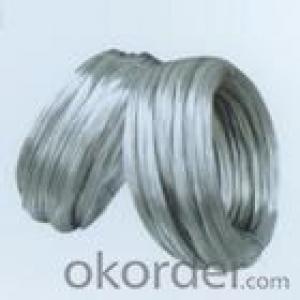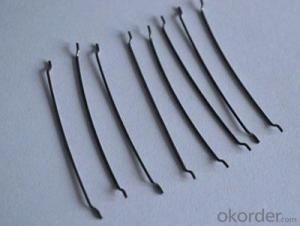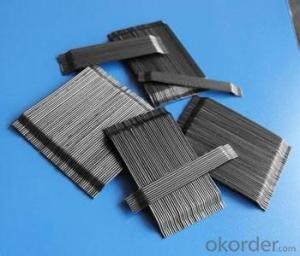Steel Fiber Special high tensile strength1800MPA for highway concrete
- Loading Port:
- Tianjin
- Payment Terms:
- TT OR LC
- Min Order Qty:
- 5 kg
- Supply Capability:
- 30000 kg/month
OKorder Service Pledge
OKorder Financial Service
You Might Also Like
Quick Details
Place of Origin: Jiangsu, China (Mainland)
Model Number: HT-ST
Material: Steel
Specifications
Specification of steel fiber
Item | Diameter (mm) | Length (mm) | Aspect Radio (L/D) | Tensile Strength (MPa) |
G50/ 25BN | 0.5 | 25 | 50 | 1100-2850 |
G60/ 30BN | 0.5 | 30 | 60 | 1100-2850 |
G70/ 35BN | 0.5 | 35 | 70 | 1100-2850 |
G70/ 35BN | 0.6 | 25 | 42 | 1100-2850 |
G50/ 30BN | 0.6 | 30 | 50 | 1100-2850 |
G58/ 35BN | 0.6 | 35 | 58 | 1100-2850 |
G40/ 30BN | 0.75 | 30 | 40 | 1100-2850 |
G47/ 35BN | 0.75 | 35 | 47 | 1100-2850 |
G80/ 60BN | 0.75 | 60 | 80 | 1100-2850 |
G38/ 30BN | 0.8 | 30 | 38 | 1100-2850 |
G44/ 35BN | 0.8 | 35 | 44 | 1100-2850 |
G75/ 60BN | 0.8 | 60 | 75 | 1100-2850 |
G56/ 50BN | 0.9 | 50 | 56 | 1100-2850 |
G67/ 60BN | 0.9 | 60 | 67 | 1100-2850 |
G50/ 50BN | 1.0 | 50 | 50 | 1100-2850 |
G60/ 60BN | 1.0 | 60 | 60 | 1100-2850 |
Picture
Steel fiber
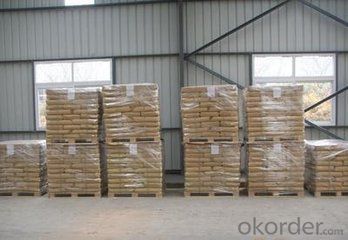
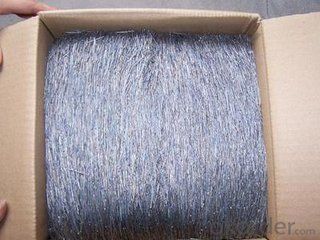
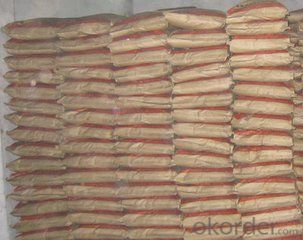
FAQ
certificated: ISO 9001
Technical advantages of Daye steel fiber:
A. Improve mechanical performance of concrete
B. Provide uniform distribution throughout concrete with excellent mixing
C. No balling or caking by adopt correct mixing method
D. Reduce concrete volume
E.Save construction time and cost
F.Reduce excavation volume
G.Available for jointless floor.
- Q:What is the effect of melt extract stainless steel fiber on the crack width of concrete elements?
- The utilization of melt extract stainless steel fiber in concrete elements yields a positive impact on the reduction of crack width. When introduced into the concrete, these fibers aid in bolstering its tensile strength and obstructing the spread of cracks. Acting as reinforcement, the fibers evenly distribute stress and forces throughout the concrete, thereby diminishing the probability and severity of cracks. Through the inclusion of stainless steel fibers, the concrete acquires heightened resistance to cracking, particularly in the face of shrinkage, temperature fluctuations, and external loads. The fibers adeptly bridge any fissures that may arise, confining their width and preventing further expansion. Furthermore, melt extract stainless steel fibers exhibit superior resistance to corrosion when compared to alternative fiber types, ensuring the long-term endurance and structural soundness of the concrete elements. This augmented resistance to corrosion serves to further reduce crack width, as cracks induced by corrosion can result in substantial structural harm. In conclusion, the integration of melt extract stainless steel fiber in concrete elements yields a favorable outcome on crack width. It aids in minimizing the formation of cracks and constrains their growth, thereby fostering improved performance, extended service life, and heightened structural integrity of the concrete elements.
- Q:How does melt extract stainless steel fiber improve the durability of sprayed concrete?
- Melt extract stainless steel fiber plays a crucial role in enhancing the durability of sprayed concrete. Firstly, these fibers act as reinforcement within the concrete matrix, effectively increasing its tensile strength and resistance to cracking. This is particularly important in sprayed concrete, where the material is subject to high-pressure application techniques, making it prone to shrinkage and cracking. Additionally, the unique properties of stainless steel fibers, such as their high corrosion resistance, help to protect the concrete from environmental factors that can degrade its durability. Stainless steel fibers are highly resistant to rust and other forms of corrosion, which can be particularly advantageous in harsh or corrosive environments. Moreover, the presence of these fibers helps to improve the impact resistance of sprayed concrete. Due to their high strength and flexibility, stainless steel fibers can absorb and distribute energy when subjected to impact or dynamic loads, reducing the risk of surface spalling or cracking. Furthermore, melt extract stainless steel fibers can enhance the overall cohesion and bond strength between the sprayed concrete and the substrate. This is crucial in sprayed concrete applications, as it ensures a strong connection between the concrete and the surface it is applied to, minimizing the risk of delamination or detachment. In summary, melt extract stainless steel fiber improves the durability of sprayed concrete by increasing its tensile strength, resistance to cracking, impact resistance, corrosion resistance, and overall bond strength. These fibers provide crucial reinforcement to the concrete matrix, making it more resilient and prolonging its service life in various challenging environments and applications.
- Q:Can melt extract stainless steel fiber be used in marine structures for shotcrete?
- Indeed, melt extract stainless steel fiber finds its application in marine structures for shotcrete. Renowned for their exceptional resistance against corrosion, stainless steel fibers prove to be a fitting choice for employment in marine settings. Shotcrete, a technique involving the pneumatic application of concrete, can reap the advantages of incorporating stainless steel fibers, as they enhance the concrete's longevity and robustness. By mitigating cracking and bolstering the shotcrete's structural integrity as a whole, these fibers render it a dependable option for marine structures confronted by demanding elements like saltwater and waves.
- Q:Can melt extract stainless steel fiber be used in earthquake retrofitting?
- Yes, melt extract stainless steel fiber can be used in earthquake retrofitting. Stainless steel fibers are known for their high strength and durability, making them a suitable material for reinforcing structures against seismic forces. These fibers can be added to concrete or other building materials to improve their tensile strength and resistance to cracking during an earthquake. Additionally, the corrosion resistance of stainless steel ensures the longevity and effectiveness of the retrofitting solution. Therefore, melt extract stainless steel fiber can be a valuable component in earthquake retrofitting projects.
- Q:How does melt extract stainless steel fiber affect the shear strength of concrete?
- Melt extract stainless steel fiber has a significant impact on the shear strength of concrete. When added to the concrete mixture, these fibers enhance its overall structural integrity and resistance to shear forces. The fibers act as reinforcement by bridging cracks and distributing stress throughout the concrete matrix. The addition of melt extract stainless steel fibers increases the interlocking effect between the fibers and the surrounding concrete matrix, resulting in improved shear strength. These fibers effectively resist the forces that cause concrete to crack and fail under shear loads. They prevent the propagation of cracks by transferring shear stresses across the crack faces, thus increasing the shear resistance of the concrete. Furthermore, the high tensile strength and ductility of stainless steel fibers make them highly effective in enhancing the shear capacity of concrete. The fibers absorb energy during loading and dissipate it through deformation, which helps to delay and control the development of cracks. This ultimately improves the shear resistance and overall durability of the concrete structure. It is important to note that the effectiveness of melt extract stainless steel fibers in enhancing shear strength depends on various factors such as fiber content, aspect ratio, and distribution within the concrete mixture. The optimal dosage and distribution of fibers should be carefully considered to achieve the desired improvement in shear strength. Additionally, proper concrete mix design and fiber dispersion techniques are crucial to ensure the successful integration and performance of the stainless steel fibers. In summary, the addition of melt extract stainless steel fibers significantly improves the shear strength of concrete by enhancing its crack resistance, transferring shear stresses, and absorbing energy. These fibers play a crucial role in reinforcing the concrete matrix and increasing its overall structural integrity, making it more resistant to shear forces and improving the durability of the concrete structure.
- Q:How does melt extract stainless steel fiber affect the crack width of concrete?
- Melt extract stainless steel fiber can effectively reduce the crack width in concrete. When added to the concrete mix, the fibers disperse throughout the matrix, creating a three-dimensional reinforcement system. As the concrete sets and hardens, the fibers provide additional tensile strength, preventing cracks from propagating and widening. The fibers act as tiny reinforcement bars, bridging the cracks and distributing the stress across a larger area, thereby limiting crack width. Consequently, the incorporation of melt extract stainless steel fibers in concrete significantly improves its durability and structural integrity.
- Q:Can melt extract stainless steel fiber be used in high-temperature environments?
- Yes, melt extract stainless steel fiber can be used in high-temperature environments. Stainless steel is known for its excellent heat resistance properties, making it suitable for applications where high temperatures are involved. Melt extract stainless steel fibers are typically made from a high-grade stainless steel alloy, which provides enhanced resistance to oxidation and corrosion at elevated temperatures. These fibers can withstand temperatures up to 1200°C (2192°F) without losing their structural integrity. Therefore, they are commonly used in industries such as aerospace, automotive, and refractories, where high-temperature environments are prevalent.
- Q:What is the typical dosage of melt extract stainless steel fiber in concrete?
- The typical dosage of melt extract stainless steel fiber in concrete varies depending on the specific application and desired performance. However, a common dosage range is typically between 20 to 40 kilograms per cubic meter of concrete.
- Q:How does melt extract stainless steel fiber contribute to the toughness of concrete?
- Improved crack resistance and enhanced flexural strength are achieved in concrete with the addition of melt extract stainless steel fibers. These fibers are typically incorporated into concrete mixes in small amounts, ensuring even distribution throughout the material. When concrete is subjected to stress or loading, such as heavy loads or temperature fluctuations, it can develop micro-cracks. However, the presence of stainless steel fibers helps to evenly distribute the stress, reducing the concentration of these cracks and preventing their propagation. As a result, the overall crack resistance of the concrete is significantly improved. Moreover, the stainless steel fibers act as reinforcement within the concrete matrix, enhancing its flexural strength. This means that the concrete can withstand greater bending forces without fracturing or breaking. Additionally, the fibers play a crucial role in controlling plastic shrinkage and drying shrinkage cracking by providing a three-dimensional reinforcement network within the concrete. The outstanding properties of melt extract stainless steel fibers, including their high tensile strength and corrosion resistance, make them an ideal choice for enhancing the toughness of concrete. They effectively bridge cracks, distribute stresses, and improve the overall structural integrity of the concrete, resulting in a more durable and long-lasting material.
- Q:Can melt extract stainless steel fiber be used in bridge construction?
- Yes, melt extract stainless steel fiber can be used in bridge construction. These fibers provide enhanced strength and durability to the concrete used in the construction of bridges, making them more resistant to cracks and corrosion. Additionally, the stainless steel composition of these fibers helps improve the overall performance and longevity of the bridge structure.
1. Manufacturer Overview |
|
|---|---|
| Location | |
| Year Established | |
| Annual Output Value | |
| Main Markets | |
| Company Certifications | |
2. Manufacturer Certificates |
|
|---|---|
| a) Certification Name | |
| Range | |
| Reference | |
| Validity Period | |
3. Manufacturer Capability |
|
|---|---|
| a)Trade Capacity | |
| Nearest Port | |
| Export Percentage | |
| No.of Employees in Trade Department | |
| Language Spoken: | |
| b)Factory Information | |
| Factory Size: | |
| No. of Production Lines | |
| Contract Manufacturing | |
| Product Price Range | |
Send your message to us
Steel Fiber Special high tensile strength1800MPA for highway concrete
- Loading Port:
- Tianjin
- Payment Terms:
- TT OR LC
- Min Order Qty:
- 5 kg
- Supply Capability:
- 30000 kg/month
OKorder Service Pledge
OKorder Financial Service
Similar products
New products
Hot products
Related keywords
